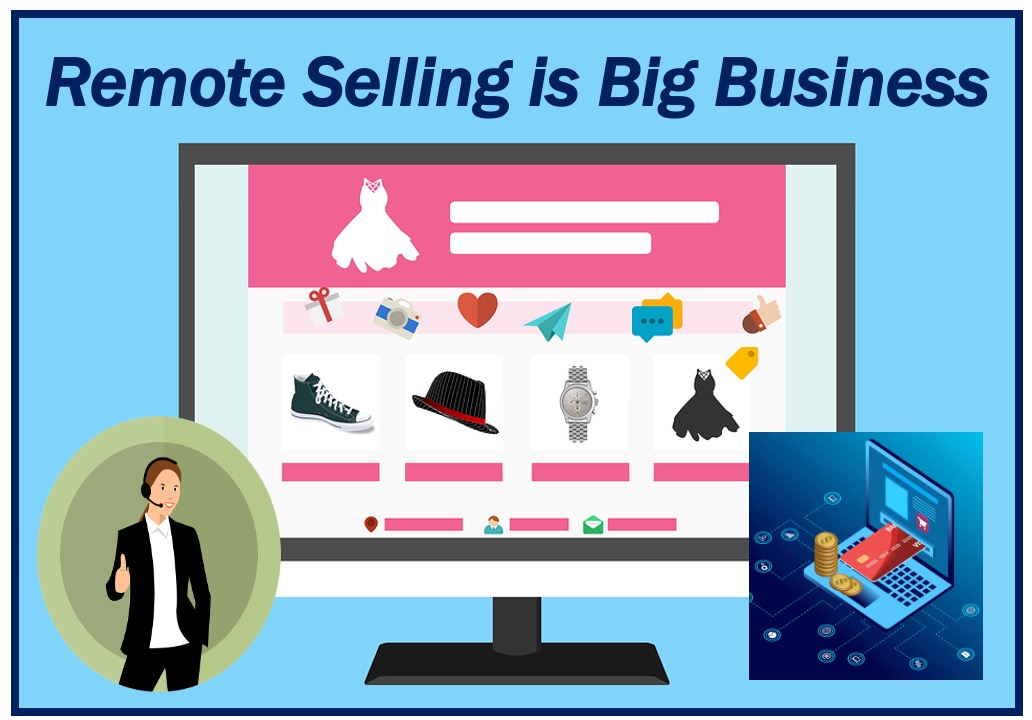What is Remote Selling? Definition and examples
If you are selling goods at a distance, i.e., your customers are far away from your point of sale, you are involved in Remote Selling. Some people use the term Virtual Selling with the same meaning.
Remote selling is common on the Internet. Before the 1990s, mail-order was the most common way to sell at a distance. Sellers would place adverts in newspapers and magazines and consumers could place their orders via normal surface mail or by telephoning.
A company that is involved in remote selling is a remote seller, while a salesperson is called a remote salesperson, remote sales representative, or remote sales rep.

Thanks to the growth of the online business world, remote selling has become a reality for all types of businesses, even very small ones. As long as you are able to offer a credit/debit card or PayPal-like service, remote selling online is fairly straightforward.
Ever since the Internet came onto the scene near the end of the last century, the number of physical stores has declined while online transactions have grown dramatically.
BigTinCan.com has the following definition of the term.
“Remote selling, otherwise called virtual selling, is a complex buying cycle where the majority of sales conversations occur with buyers and sellers in different physical locations.”
Remote selling offers benefits
For retailers, remote selling offers various advantages, such as:
-
Cheaper running costs
The seller does not need to have a physical store, and thus pays no rent (apart from perhaps a warehouse or storage room), utilities, sales assistants, etc.
-
Longer reach
Retailers have access to consumers in their own town, across the country, continent, and even on the other side of the world.
-
Consumers can buy from anywhere
Consumers can purchase items at home, in their places of work, or while traveling on a train or bus. They can scan through various websites quickly while making comparisons.
In the pre-Internet world, shoppers had to travel from store to store, which was time consuming.
-
Consumer and market metrics
Online sellers can gather and analyze customer and market data, which allow them to better target their prospects. A prospect is a consumer who you believe could well become a customer.
For marketing professionals and entrepreneurs, the Internet is a godsend.
Remote selling challenges
If you are wondering whether to start selling remotely online, remember that the marketplace today is fiercely competitive. Because of sellers’ longer reach and other benefits, there are many more competitors today in most sectors compared to a couple of decades ago.
It is harder to build up a good personal relationship with your customers if you do not physically meet them. However, there are strategies you can adopt to improve customer loyalty and your brand image.
If the number of returns is high (requests for refunds), you can lose a lot of money because of shipping costs. It is also time-consuming.
Secrets of success
You should try to build a strong online presence, make sure that your website is consumer friendly, and aim to provide the best customer service possible. Your website should be attractive for users of desktops, laptops, tablets, and smartphones.
Online security is crucial, both for you and your customers. Ensure that all checkout and payment processes are super secure. They must also be easy to use.
If you are considering selling remotely, remember what you have read in this article. Good luck!
Video – What is Remote Selling
Watch this interesting video about remote selling from our sister site, YouTube channel ‘Marketing Business Network.’

